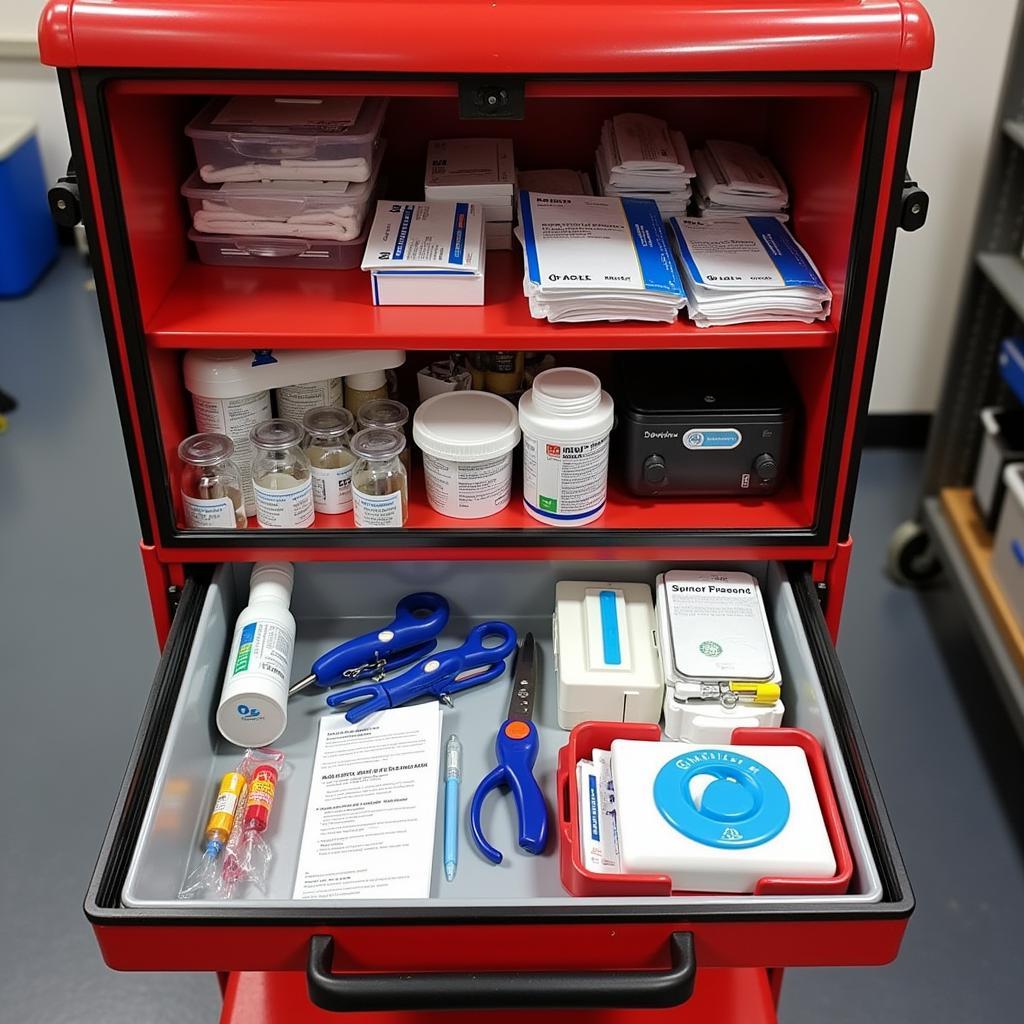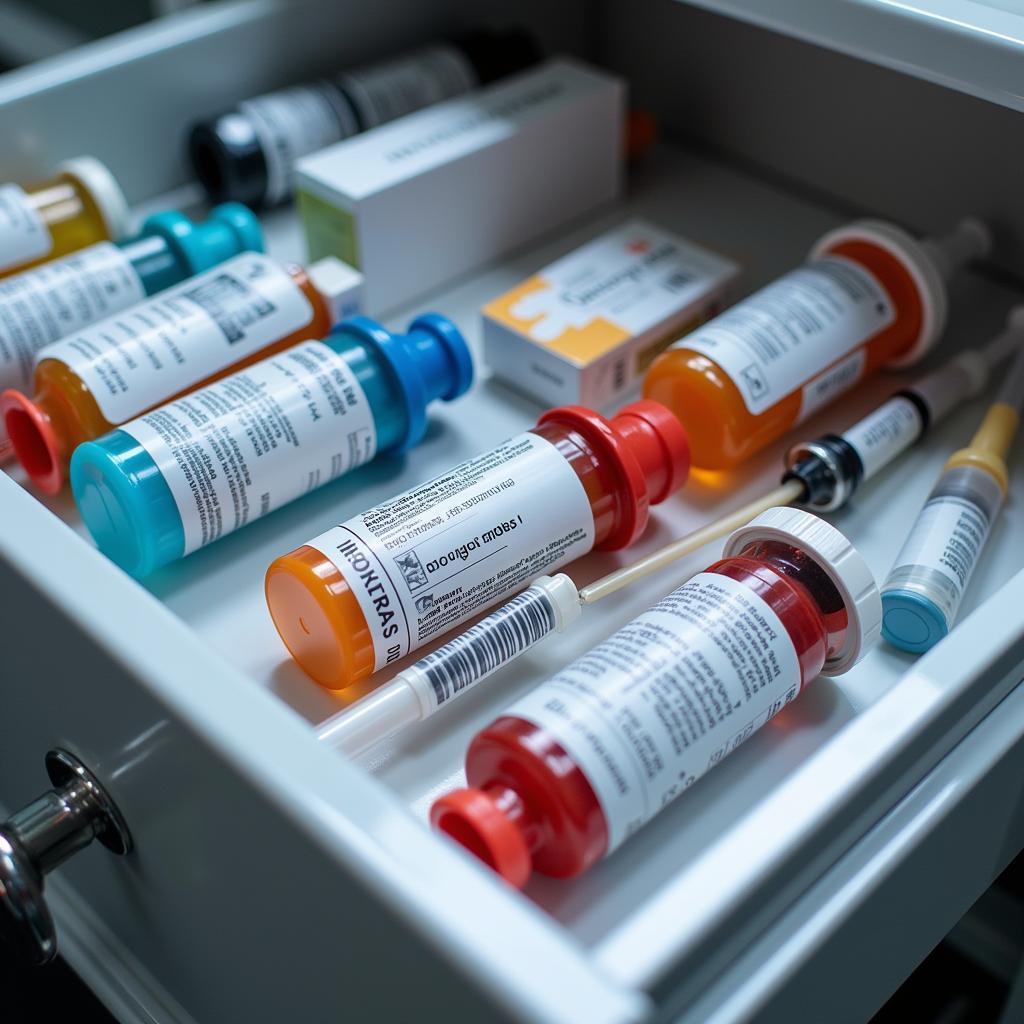A Crash Cart In Hospital is a vital piece of equipment designed for responding to medical emergencies. These mobile units contain essential medications, supplies, and equipment needed to provide immediate life-saving interventions. Understanding the importance of a fully stocked and readily available crash cart is crucial for ensuring patient safety and positive outcomes. Let’s delve into the intricacies of this critical component of hospital preparedness.
 Crash Cart Contents for Hospital Emergency Response
Crash Cart Contents for Hospital Emergency Response
The Importance of the Crash Cart
Crash carts are strategically positioned throughout hospitals for rapid access during emergencies like cardiac arrest, respiratory failure, or severe allergic reactions. They are designed for mobility, allowing medical professionals to bring life-saving interventions directly to the patient’s bedside, saving precious time in critical situations. The presence of a well-equipped crash cart can be the difference between life and death. A quick response with the appropriate tools and medications can significantly improve patient outcomes.
Inside the Crash Cart: A Detailed Look
A standard crash cart contains a variety of items categorized for easy access. Medications, including epinephrine, atropine, and sodium bicarbonate, are readily available for administering during various emergencies. Airway management tools such as endotracheal tubes, laryngoscopes, and bag-valve masks are essential for securing and maintaining a patient’s airway. Intravenous (IV) supplies, including catheters, fluids, and tubing, allow for quick fluid and medication administration. A defibrillator is a crucial component used to restore normal heart rhythm during cardiac arrest. Finally, other essential supplies include syringes, needles, gloves, and bandages.
 Hospital Crash Cart Organization and Medication
Hospital Crash Cart Organization and Medication
What Equipment is on a Hospital Crash Cart?
Beyond the core components, some hospitals may equip their crash carts with additional specialized equipment like pediatric-sized equipment, advanced airway management tools, or medications specific to certain patient populations. The specific contents of a crash cart can vary based on the hospital’s level of care and patient demographics.
Maintaining the Crash Cart
Regular checks and maintenance are essential for ensuring crash cart readiness. Expired medications must be replaced, and supplies should be restocked after each use. A designated individual or team is typically responsible for routine inspections and maintaining accurate inventory. This meticulous approach guarantees that the crash cart is always fully operational and equipped to handle any emergency.
Crash Cart Training for Healthcare Professionals
Effective use of the crash cart requires specialized training. Healthcare professionals undergo regular drills and simulations to familiarize themselves with the cart’s contents and procedures for using the equipment. These training sessions ensure that staff can respond swiftly and efficiently in emergency situations, maximizing the crash cart’s life-saving potential.
“Regular training is paramount for maintaining proficiency in using the crash cart,” states Dr. Emily Carter, MD, Emergency Medicine Physician. “It’s not just about knowing where things are located, but also understanding how to use them effectively under pressure.”
Conclusion
The crash cart in hospital settings is an indispensable tool for responding to medical emergencies. Its comprehensive inventory of medications, supplies, and equipment, combined with regular training for healthcare professionals, allows for rapid and effective intervention, ultimately improving patient outcomes and saving lives. Understanding the crucial role of the crash cart underscores the hospital’s commitment to providing high-quality patient care in critical situations.
FAQs
- Who is responsible for maintaining the crash cart?
- How often are crash cart drills conducted?
- What are the most common medications found in a crash cart?
- What is the purpose of a defibrillator in a crash cart?
- How can I learn more about crash cart procedures?
When you need assistance, please contact Phone Number: 02437655121, Email: [email protected] Or visit us at: 298 Cau Dien St., Minh Khai, Bac Tu Liem, Hanoi, Vietnam. We have a 24/7 customer service team.